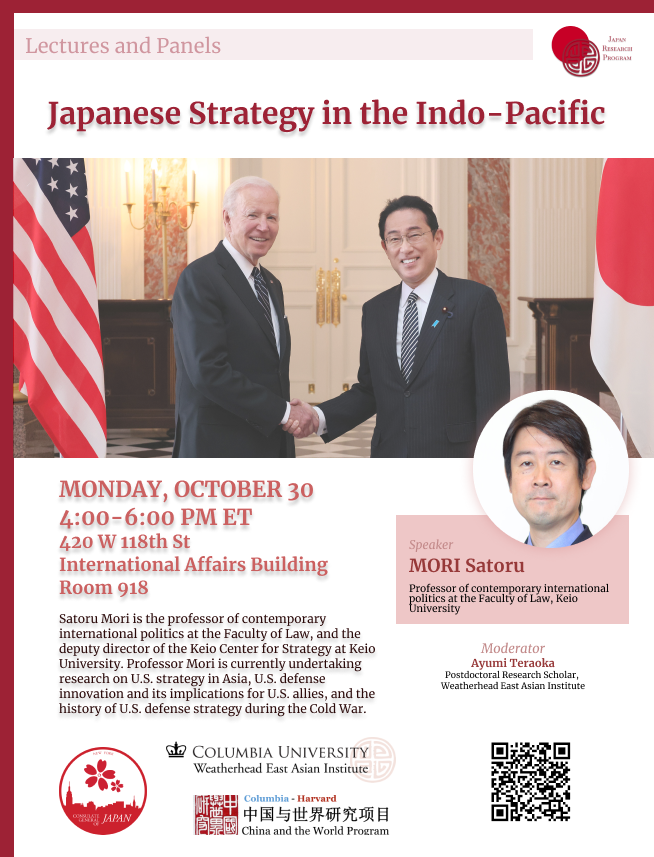Speaker: Satoru Mori, Professor, Keio University
Moderator: Ayumi Teraoka, Postdoctoral Research Scholar, Weatherhead East Asian Institute
Facing an ever-intensifying security environment and rapidly shifting diplomatic and economic landscapes in the Indo-Pacific region, Japan aims to minimize the risks of an armed conflict while maximizing opportunities for region-wide economic and social exchange in an era of enduring great power rivalry. What are Japan’s challenges in deterring an armed conflict over Taiwan? What is Japan’s Free and Open Indo-Pacific and what are its implications for the region? How does Japan envisage the roles that the Japan-US alliance and security cooperation with other countries may play in the Indo-Pacific? These and other issues and questions will be explored in order to illuminate what role Japan can play in regional security.
Speaker's Bio: Satoru Mori is the professor of contemporary international politics at the Faculty of Law, and the deputy director of the Keio Center for Strategy at Keio University. Professor Mori is currently undertaking research on U.S. strategy in Asia, U.S. defense innovation and its implications for U.S. allies, and the history of U.S. defense strategy during the Cold War. He is a former Japanese Foreign Ministry official and holds a Ph.D. degree from the University of Tokyo, LL.M. degrees from Columbia University Law School and Kyoto University, and a LL.B. degree from Kyoto University. He was a professor at Hosei University’s Faculty of Law from 2010 to 2022. During his sabbatical leave, he was a visiting researcher at Princeton University (2014-2015) and George Washington University (2013-2015). His book on U.S. diplomatic history The Vietnam War and Alliance Diplomacy published from the University of Tokyo Press in 2009 (in Japanese) was awarded the 15th Hiroshi Shimizu Prize for Distinguished Academic Work from the Japanese Association of American Studies. English publications include “The Case for Japan Acquiring Counterstrike Capabilities: Limited Offensive Operations for a Defensive Strategy,” (co-authored with Shinichi Kitaoka) in Scott Harold et al., Japan’s Possible Acquisition of Long-Range Land Attack Missiles and the Implications for the U.S.-Japan Alliance, (RAND Corporation, 2022) 7-25, “U.S. Technological Competition with China,” Asia Pacific Review 26:1 (2019) 77-120, and "The Promotion of Rules-based Order and the Japan-U.S. Alliance" in Michael J. Green ed., Ironclad: Forging a New Future for America's Alliances (Rowman & Littlefield, 2019) 97-112. Japanese publications include U.S.-China Relations and the World Order After COVID-19 (co-editor, University of Tokyo Press, 2020), War in Ukraine and Its Global Consequences (co-author, University of Tokyo Press, 2022), and The Dynamics of International Orders: Historical, Theoretical and Legal Perspectives (co-author, Chikura Shobo, 2023). Professor Mori currently chairs the Japan-US alliance project at the Nakasone Peace Institute, and the security policy project at the Japan Institute for International Affairs among other projects. He is a senior fellow at the Nakasone Peace Institute since 2018. He was a senior fellow of the National Security Secretariat of the Cabinet Secretariat of the Japanese government (2016-2019). He is a member of the Ministry of Defense’s New Defense Policy Roundtable. He was among the experts called upon by the National Security Secretariat during the hearings in 2022 on the revision of Japan’s strategic documents.
This event is hosted by the Weatherhead East Asian Institute, Japan Research Program and co-sponsored by the Consulate General of Japan in New York and the Columbia-Harvard China and the World Program.
Registration:
- To attend this event in-person, please register HERE.
- To attend this event online, please register HERE.

